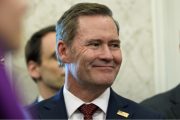
The team of Democratic presidential nominee Vice President Kamala Harris states she “does not support” an electric vehicle (EV) mandate, despite her past support for legislation that would effectively mandate the adoption of EVs.
Denial
The debate over Harris’ stance on electric vehicles erupted when her campaign’s director of rapid response, Ammar Moussa, accused Donald Trump’s running mate, Senator J.D. Vance (R-Ohio), of “lying and gaslighting” about her position. In a campaign email, Moussa “fact-checked” the claim that “Vice President Harris wants to force every American to own an electric vehicle” by explicitly stating, “Vice President Harris does not support an electric vehicle mandate.” He argued that the Biden-Harris administration has focused on incentivizing rather than mandating EV production.
Moussa referenced a few initiatives by the administration that aim to promote electric vehicle use, such as creating “tens of thousands of new, clean energy jobs in Michigan” and offering “ground-breaking subsidies” and tax credits for EV purchases.
Draconian EPA Rule
Not surprisingly, the operative avoided addressing the new tailpipe emissions rule called “Multi-Pollutant Emissions Standards for Model Years 2027 and Later Light-Duty and Medium-Duty Vehicles,” introduced by the Environmental Protection Agency (EPA) this March. The rule is arguably designed to push automakers to increase their production of electric vehicles by “de facto [banning] the sales of gas powered and traditional hybrid vehicles,” as explained by the House’s Budget Committee.
The U.S. Oil and Gas Association (USOGA), one of the oldest trade groups representing the oil and gas industry, highlighted that a new rule would require 56 percent of all new vehicles sold to be electric by 2032. According to USOGA, this rule originated from the Inflation Reduction Act, which Kamala Harris supported by casting the deciding vote in August 2022.
The USOGA detailed the harsh requirements of the rule:
FACT: That rule requires 44% of new vehicles in 2030 and 56% of new vehicles sold in 2032 to be EVs.
FACT: Under that rule, gas-powered vehicles which are over 90% of the market are to be reduced to 29% by 2032.
While these stringent “climate” regulations in U.S. history fall short of an outright mandate, they suggest an unprecedentedly strong federal push toward electrification.
Harris’ Record of Supporting EVs
While her campaign insists that she does not support forcing Americans to adopt electric vehicles, Harris’ legislative history and the Biden administration’s actions tell a different story.
As a senator from California, she co-sponsored the Zero-Emission Vehicles Act of 2019, which aimed to mandate that 50 percent of new passenger vehicles sold in the United States be zero-emission by 2030, and 100 percent by 2040.
Harris even supported a more aggressive version of the bill that called for a complete ban on non-zero-emission vehicles by 2035, as appears from the archived page of her 2020 campaign website unearthed by the Washington Free Beacon. The legislation would have given the EPA the authority to enforce this mandate, reflecting Harris’ previous commitment to reducing greenhouse gas emissions and “combating climate change.”
Harris also advocated for a faster transition of the auto industry to producing EVs. “The auto industry is clearly moving toward electric,” she said in 2021. “We need to make the shift faster and make sure it is driven by the United States.”
Green New Deal
Harris’ past endorsement of the Green New Deal further underscores her earlier stance on stringent “environmental” reforms.
“The Green New Deal is a bold plan to drastically shift our country to 100% clean and renewable energy,” Harris wrote in a Medium post on the day the Senate introduced a resolution in support of the bill, saying how “proud” she was to back it.
This July, she secured the endorsement of the Green New Deal Network, a powerful coalition of various organizations and advocacy groups that support the principles and policies outlined in the Green New Deal.
School Buses & Charging Stations
In addition to that, since becoming vice president, Harris has maintained a high profile in promoting the Biden administration’s “clean energy” initiatives, including the Clean School Bus program. Launched as part of the 2021 infrastructure bill, the initiative aims to replace traditional, diesel-powered school buses with electric or low-emission alternatives. The program is backed by the EPA and allocates $5 billion to fund these new buses. Harris has emphasized the initiative’s role in reducing air pollution, improving children’s health, and advancing the administration’s broader climate goals.
She has also been actively involved in promoting the Electric Vehicle Charging Action Plan aimed at accelerating the deployment of EV charging infrastructure across the country. The plan aims to support the administration’s goal of ensuring that 50 percent of all new vehicle sales are electric by 2030. The plan includes $7.5 billion from the 2021 infrastructure bill to install a nationwide network of 500,000 EV chargers.
Both programs have faced challenges in meeting their goals, with extremely limited success in deploying new electric school buses and charging stations.
Trump Shifts, Too
While Kamala Harris is working to manage the fallout from her extensive record on electric vehicles, her presidential opponent, Donald Trump, now appears to be softening his stance on the issue.
In July, Trump, a fervent critic of “climate change” regulations, pledged to roll back Biden’s EV subsidies, calling them a “green new scam.”
However, after landing the endorsement of Tesla’s CEO Elon Musk, Trump admitted at one of his rallies, “I’m for electric cars. I have to be, because Elon endorsed me very strongly. So I have no choice.”
Still, in early August, Trump told Maria Bartiromo of Fox News that while he “liked Tesla,” he believed only a small portion of the car market should be electric, citing concerns that, unlike China, the United States lacks the natural resources necessary for widespread EV production.
Last week, he said that “he may” end the EV tax credit and that he was open to offering Musk an advisory position in his Cabinet.





